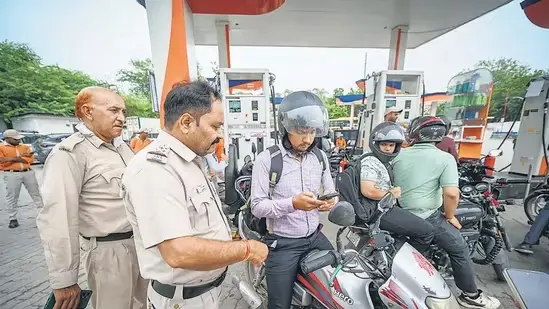
Delhi’s bold move to ban fuel sales for end-of-life vehicles has triggered a wave of mixed reactions
The Ban Begins: What the New Rule Means for Delhi’s Roads
Delhi Fuel Ban – In a landmark step to combat air pollution, the Delhi government has officially enforced a ban on fuel sales to end-of-life (EoL) vehicles starting July 1, 2025. The rule prohibits petrol and CNG vehicles older than 15 years and diesel vehicles older than 10 years from being refueled at any of the city’s 350+ petrol pumps.
The enforcement is powered by Automatic Number Plate Recognition (ANPR) cameras installed at fuel stations, which scan vehicle plates and cross-reference them with the VAHAN database. If a flagged vehicle attempts to refuel, an alert is triggered, and enforcement teams comprising Delhi Police, Traffic Police, and Transport Department officials step in.
On Day 1 alone, over 80 vehicles were seized, and dozens more were turned away. Petrol pump staff have been instructed to deny fuel to flagged vehicles and maintain records of such incidents. Signboards at stations now read:
“Fuel will not be dispensed to End-of-Life Vehicles i.e. 15 years old Petrol and CNG and 10 years old Diesel from 01.07.2025.”
The policy is rooted in Supreme Court and National Green Tribunal rulings that restrict the use of older vehicles due to their disproportionate contribution to pollution. According to the Centre for Science and Environment (CSE), vehicular emissions account for over 50% of Delhi’s local air pollution a staggering figure that has long demanded urgent action.
Voices from the Streets: Applause, Anger, and Anxiety
As expected, the policy has sparked mixed reactions across the capital. While many residents welcomed the move as a long-overdue step toward cleaner air, others criticized it as arbitrary, economically harsh, and poorly communicated.
Supporters argue that the ban is necessary to protect public health. “Pollution in Delhi is unbearable. This is a bold and necessary step,” said a resident from Lajpat Nagar. Environmental groups have also praised the government for finally enforcing a rule that had been on paper for years.
However, critics are raising serious concerns:
- Economic burden: “What if I can’t afford a new car?” asked a commuter whose 11-year-old diesel vehicle was turned away. Many middle-class families feel the policy forces them into unplanned financial strain.
- Lack of nuance: Owners of well-maintained vehicles argue that age alone shouldn’t be the criterion. “My car is in perfect condition and passes pollution checks. Why should I be punished?” said a resident from Rohini.
- Unequal enforcement: Some questioned why government vehicles and VIP fleets are often exempt from such rules. “The law should be equal for all,” said a college student whose scooter was impounded.
Social media has been ablaze with hashtags like #FuelBanDelhi, #JusticeForCarOwners, and #CleanAirNow, reflecting the polarized public mood. While some users posted photos of clear skies and thanked the government, others shared videos of confrontations at fuel stations and called the policy “elitist” and “anti-poor.”
What’s Next: Enforcement, Alternatives, and the Road Ahead
The Delhi government has made it clear that the ban is non-negotiable and will be strictly enforced. Violators face fines under the Motor Vehicles Act, and fuel stations that ignore the rule risk penalties and license suspension.
To support the transition, authorities are urging vehicle owners to:
- Scrap their EoL vehicles through authorized centers and avail incentives under the Vehicle Scrappage Policy
- Switch to electric vehicles (EVs), with subsidies available under the Delhi EV Policy
- Use public transport, which is being expanded with new buses and metro lines
However, experts warn that enforcement alone won’t solve Delhi’s pollution crisis. “This is a good start, but it must be part of a larger strategy,” said an environmental policy analyst. “We need better public transport, cleaner fuels, and stricter industrial emissions control.”
The government is also considering expanding the ban to neighboring NCR regions, where many old vehicles are registered but operate within Delhi. Coordination with Haryana and Uttar Pradesh will be key to preventing policy leakage.
Conclusion on Delhi Fuel Ban
Delhi fuel ban for end-of-life vehicles is a bold experiment in urban environmental governance. It has already begun reshaping the city’s streets and its conversations. Whether it becomes a model for other cities or a cautionary tale will depend on how fairly it’s enforced, how well it’s supported, and how deeply it’s understood. For now, the capital stands divided but undeniably cleaner.
Stay updated with the latest news on Rapido Updates. Keep yourself updated with The World, India News, Entertainment, Market, Automobile, Gadgets, Sports, and many more
1 thought on “Delhi Fuel Ban Sparks Outrage and Applause: End-of-Life Vehicle Crackdown Divides the Capital”